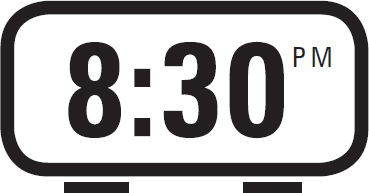

Admit it: is this book your second source of media consumption right now? What’s the first? Is it a smartphone? A tablet? One of those old-fashioned inventions, the color TV? If so, your brain is being eaten alive as surely as if you were a nameless supporting character in a 1970s zombie flick.
Let’s go back to that color TV. In 2011 an article in the journal Dreaming described an interesting feature of dreams from 2,077 people surveyed in 1993 and another 1,328 surveyed in 2009. The feature was whether people dreamed in color. Overall, younger people dreamed in color—80 percent compared to only about 20 percent by age sixty. That’s great: it seems as if color dreaming is a skill of young brains.
But here’s the interesting part: color dreaming increased from 1993 to 2009 only for people in their twenties, thirties, and forties. For some reason, more young color-dreamers were being pumped into the system. To discover why, you have to look thirty years earlier. From 1964 to 1978—the formative years of this new crop of color-dreamers—the percentage of households with a color television grew from 3.1 percent to 78 percent. The researchers of the article in Dreaming blame color television and not young age for the ability to dream in color. It’s unclear what percentage of these color dreams were specifically related to Jaws and Children of the Corn. But what is clear is that technology has the very real potential to change your brain—dude, color TV changes the complexion of your dreams.
Technology is also robbing us of sleep. When Thomas Edison invented the lightbulb, he forever unbound humanity from the rhythm of daylight and night. Your cognitive mind can thumb its nose at circadian rhythm, but your lizard brain didn’t get the memo—it still wants to go to sleep when it’s dark and be awake when it’s light. See, it’s supposed to get dimmer in the evening as we wind down toward bedtime. When you read on a tablet device, it doesn’t have to (and when you play that adrenaline-inducing app instead of reading, your body doesn’t get dimmer either). The chemical melatonin is the substance that makes you sleep. When the world gets dim, your brain produces melatonin and you get drowsy. But when the world stays light, no matter the time of day, your eyes tell your brain to produce less melatonin, making it harder to get to sleep. In an article for CNN, Mariana Figueiro, director of the Lighting Research Center at Rensselaer Polytechnic Institute, recommends wearing orange sunglasses in bed while reading on an iPad, as the colored lenses filter the blue light to which our eyes are especially sensitive. (We’ll give that one a maybe.)
Even outside the memory-crushing effects of sleep deprivation, technology punks your ability to hold on to facts. In 2007 Ian Robertson, director of the Trinity College Institute of Neuroscience in Dublin, asked three thousand people to remember basic personal information—their phone number, their home address, a relative’s birthday. Now, we all know that older people have a tough time remembering things, so cut them some slack. Actually, they didn’t need it: 87 percent of people over fifty could recall a relative’s birthday, but less than 40 percent of people under thirty could do the same. A third of people in their twenties couldn’t recall their own phone number and had to look it up on their digital device. And that was 2007, folks!
Then, after you forget the basic information that connects you to other human beings, Google takes care of the rest. A series of studies published in Science shows that when faced with a difficult memory task, instead of immediately reaching deep into our memories, our brains are now primed to think about computers—our first thought isn’t “Gosh, I wonder if I can remember the name of that actor that’s on the tip of my tongue,” it’s “Gosh, I should Google for the name of that actor on the tip of my tongue.” And when you know there will be a way to find information later, you allow your memory to forget it. We’ve known this for years with lists—writing down your grocery list lets you forget what’s on it. And Google functions as the great cultural grocery list. Because it lists everything, you can forget everything. The Science article likens technology-assisted remembering to a neuroprosthesis—the crutch of an artificial appendage that you can depend on to make up for a function that you have lost. Over time, wearing a back brace allows you to lose core strength, and over time, the support of Google can let your memory go equally flaccid.
The question is not whether technology has changed and is continuing to change the human brain, but whether it’s changing our brains in ways that are overall beneficial or detrimental. Do you really need to spend brain space remembering the names of U.S. presidents when you can look them up so simply? Might the brain space that in past years would have been used remembering state capitals and relatives’ birthdays be repurposed for tasks like creativity and insight? And might the disruption of our sleep due to bright tablets be worth the sleep benefits of not having a partner on the other side of the bed polluting your sleep with light from a bedside lamp? Really, it’s all too new to tell. If you can, put a peg in this question of technology’s influence and let’s revisit it in another twenty or fifty years … that is, if you can remember.